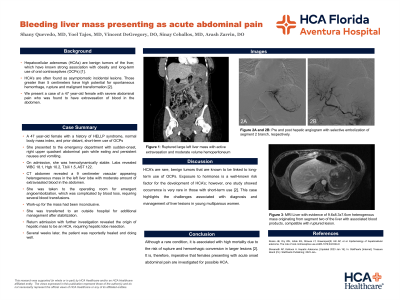Tuesday Poster Session
Category: Liver
P3907 - Bleeding Liver Mass Presenting as Acute Abdominal Pain
Tuesday, October 24, 2023
10:30 AM - 4:00 PM PT
Location: Exhibit Hall

Has Audio

Shany M. Quevedo, MD
HCA East Florida Division
Aventura, FL
Presenting Author(s)
Shany M.. Quevedo, MD1, Yoel Tajes, MD2, Vincent DeGregory, DO2, Sinay Ceballos, MD3, Arash Zarrin, DO1
1HCA East Florida Division, Aventura, FL; 2HCA Aventura Hospital & Medical Center, Aventura, FL; 3HCA Aventura Hospital & Medical Center, Miami, FL
Introduction: Hepatocellular adenomas (HCAs) are benign tumors of the liver, which have known strong association with obesity and long-term use of oral contraceptives (OCPs) [1]. While often found as asymptomatic incidental lesions, those greater than 5 centimeters have high potential for spontaneous hemorrhage, rupture and malignant transformation [2]. We present a case of a 47 year-old female with severe abdominal pain who was found to have extravasation of blood in the abdomen.
Case Description/Methods: A 47 year-old female with a history of HELLP syndrome, normal body mass index, and prior distant, short-term use of OCPs presented to the emergency department with sudden-onset, right upper quadrant abdominal pain while eating and persistent nausea and vomiting. On admission, she was hemodynamically stable. Labs revealed WBC 18.1, Hgb 10.2, T.bili 1.5, AST 122. CT abdomen revealed a 9 centimeter vascular appearing heterogeneous mass in the left liver lobe with moderate amount of extravasated blood in the abdomen. She was taken to the operating room for emergent angioembolization, which was complicated by blood loss, requiring several blood transfusions. At this time, work-up for the mass had been inconclusive. She was transferred to an outside hospital for additional management after stabilization. Return admission with further investigation revealed the origin of hepatic mass to be an HCA, requiring hepatic lobe resection. Several weeks later, the patient was reportedly healed and doing well.
Discussion: HCA’s are rare, benign tumors that are known to be linked to long-term use of OCPs. Exposure to hormones is a well-known risk factor for the development of HCA’s; however, one study showed the rate of occurrence in women who used OCP’s less than 24 months ranged between 1 and 1.3 per million, making it exceedingly rare. Although a rare condition, it is associated with high mortality due to the risk of rupture and hemorrhagic conversion in larger lesions [2]. It is, therefore, imperative that females presenting with acute onset abdominal pain are investigated for possible HCA.
Disclosures:
Shany M.. Quevedo, MD1, Yoel Tajes, MD2, Vincent DeGregory, DO2, Sinay Ceballos, MD3, Arash Zarrin, DO1. P3907 - Bleeding Liver Mass Presenting as Acute Abdominal Pain, ACG 2023 Annual Scientific Meeting Abstracts. Vancouver, BC, Canada: American College of Gastroenterology.
1HCA East Florida Division, Aventura, FL; 2HCA Aventura Hospital & Medical Center, Aventura, FL; 3HCA Aventura Hospital & Medical Center, Miami, FL
Introduction: Hepatocellular adenomas (HCAs) are benign tumors of the liver, which have known strong association with obesity and long-term use of oral contraceptives (OCPs) [1]. While often found as asymptomatic incidental lesions, those greater than 5 centimeters have high potential for spontaneous hemorrhage, rupture and malignant transformation [2]. We present a case of a 47 year-old female with severe abdominal pain who was found to have extravasation of blood in the abdomen.
Case Description/Methods: A 47 year-old female with a history of HELLP syndrome, normal body mass index, and prior distant, short-term use of OCPs presented to the emergency department with sudden-onset, right upper quadrant abdominal pain while eating and persistent nausea and vomiting. On admission, she was hemodynamically stable. Labs revealed WBC 18.1, Hgb 10.2, T.bili 1.5, AST 122. CT abdomen revealed a 9 centimeter vascular appearing heterogeneous mass in the left liver lobe with moderate amount of extravasated blood in the abdomen. She was taken to the operating room for emergent angioembolization, which was complicated by blood loss, requiring several blood transfusions. At this time, work-up for the mass had been inconclusive. She was transferred to an outside hospital for additional management after stabilization. Return admission with further investigation revealed the origin of hepatic mass to be an HCA, requiring hepatic lobe resection. Several weeks later, the patient was reportedly healed and doing well.
Discussion: HCA’s are rare, benign tumors that are known to be linked to long-term use of OCPs. Exposure to hormones is a well-known risk factor for the development of HCA’s; however, one study showed the rate of occurrence in women who used OCP’s less than 24 months ranged between 1 and 1.3 per million, making it exceedingly rare. Although a rare condition, it is associated with high mortality due to the risk of rupture and hemorrhagic conversion in larger lesions [2]. It is, therefore, imperative that females presenting with acute onset abdominal pain are investigated for possible HCA.
Disclosures:
Shany Quevedo indicated no relevant financial relationships.
Yoel Tajes indicated no relevant financial relationships.
Vincent DeGregory indicated no relevant financial relationships.
Sinay Ceballos indicated no relevant financial relationships.
Arash Zarrin indicated no relevant financial relationships.
Shany M.. Quevedo, MD1, Yoel Tajes, MD2, Vincent DeGregory, DO2, Sinay Ceballos, MD3, Arash Zarrin, DO1. P3907 - Bleeding Liver Mass Presenting as Acute Abdominal Pain, ACG 2023 Annual Scientific Meeting Abstracts. Vancouver, BC, Canada: American College of Gastroenterology.
